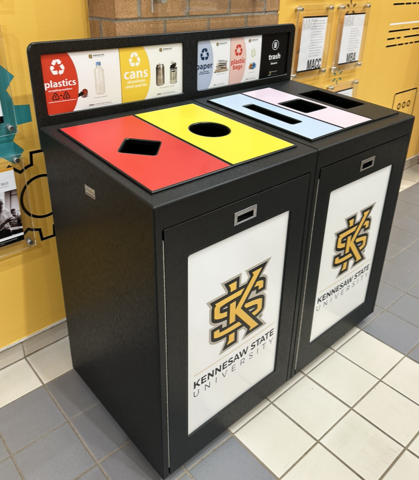In response to global recycling embargoes, Kennesaw State’s sustainability infrastructure updates have been installed across both campuses earlier this month.
Issues with sustainability have become more prominent over the last decade following the effects of China’s 2017 National Sword policy. According to Rami Al-Ademi’s research paper on the global effects of the policy, the passing “banned the importation of certain types of solid waste, as well as set strict contamination limits on recyclable materials.”
Since the policy’s enactment, countries worldwide have had to seek alternative recycling practices to stifle the amount of plastic going to waste, according to AP news. To combat contamination and ease new recycling infrastructure, new bins and labels have been installed across the Kennesaw and Marietta campuses.
The new system varies considerably from the previous single-stream bins. Bins are now multi-streamed, meaning that paper, metal and plastic materials each have their respective slots for disposal. This new system also reduces the possibility of contaminated recycled material soiling good material.
“A lot of people would put things in the single-stream recycling bin simply because it says recycling,” KSU’s sustainability coordinator, Seth Moore said. “They want things to be recycled and they want to do the right thing. This is something we called wishcycling.”
Wishcycling is when items that are not fit for a recycling type are placed in a bin incorrectly, leading to an entire bag, bin location, or dumpster being taken to a garbage facility instead of a recycling location. At times, Moore said, the best thing to do is to just dispose of potentially unrecyclable material in a trash bin rather than contaminate the ‘acceptable’ collection.
“I think we can ask students that when they recycle, to just pay attention to the new labels and make sure that they’re familiar with what actually can and can’t be recycled,” Moore said.
According to Moore, recycling was quite straightforward in 2017. The average American could throw their coffee cup or cardboard packaging into a multi-stream recycling can and hope they were taking part in a movement for sustainability. China and India were primary destinations for recycling before they began struggling with contaminated import shipments. This led to the two placing global embargoes on recycling material and left most of the world scrambling for an alternative. Since then, the answer has become to specialize collections into single-stream units instead of multi-stream ones, so more collection entities are accessible for transport.
For KSU students and staff, the primary goal should be to recycle accurately instead of often. The most common contaminants are usually food and drink waste. Common disposable coffee cups contain a mix of paper and plastic materials that cannot be recycled in the same way the other plastic or paper products can be. Some food containers, like chip bags, are made up of mixed plastics that cannot be separated in the recycling process. This type of packaging must be thrown in waste containers. The Waste Management website provides a comprehensive list of what materials can and cannot be recycled for reference.
If students have any questions about recycling on campus, they are encouraged to email recycle@kennesaw.edu, sustainableKSU@kennesaw.edu or to follow the Department of Sustainability’s Instagram at @sustainableKSU.




